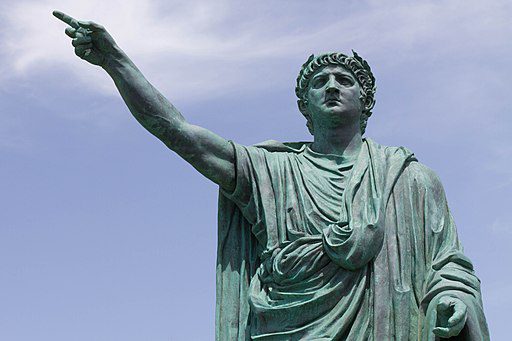The Left keeps charging conservatives with rejecting democracy. That’s mostly a slander. But some on the “illiberal right,” those who criticize the American founders for their “Enlightenment” values such as liberty and representational government, do imply that. This is true especially of the Roman Catholic “integralists” who would like to restore the old rule of pope and Holy Roman Emperor.
But now a “Christian nationalist,” a Protestant, is coming right out into the open, saying that democracy should be scrapped in favor of rule by a “Caesar,” whom he defines as “a sort of national god.”
In Christianity Today, Paul D. Miller writes about Stephen Wolfe’s book The Case for Christian Nationalism. Miller is himself the author of The Religion of American Greatness: What’s Wrong with Christian Nationalism. So this is not a dispassionate review, but a debate. Perhaps he is mischaracterizing what Wolfe says or taking it out of context. But consider the quotations from Wolfe’s book:
Sustaining such a world, of course [the Christian society that Wolfe envisions] requires more than the church; it requires a Christian culture and a Christian prince. Wolfe wants to enlist the power of the state and the pressure of social conformity to bolster Christian nationhood. He calls for a “measured and theocratic Caesarism,” overseen by a “prince as a world-shaker for our time, who brings a Christian people to self-consciousness,” a man of “dignity and greatness of soul.” In a footnote he frankly states that “modern democracy is often more oppressive than its alternatives. I prefer Caesarism in our time.” . . .
Wolfe’s Christian prince has a far more expansive mandate than our liberal democracies do. “Civil government ought to direct its people to the true religion,” he argues. He roots this assertion not in Scripture (which does not say any such thing), but as “a principle of nature.” This is the cornerstone of all that follows, for the premise can justify anything done for the sake of whatever the government deems “true religion.” Again, Wolfe pays scant attention to how the Fall corrupts governments or to how we ought to guard against their inclination toward abuse and oppression.
Armed thus, the Christian prince is empowered to protect the church from heretics, fund religious education, convene and moderate synods “to resolve doctrinal conflicts,” and “confirm or deny their theological judgments.” Wolfe pays lip service to a version of the separation of church and state—but it’s unclear why he bothers. If the prince can decide whose theological school to fund, how to define heresy, and which theological judgments to endorse, whatever vestigial independence the church has is strictly pro forma. . . .
Wolfe spent the scholarly portion of his book calling for “theocratic Caesarism” helmed by a great-souled, world-shaking prince who is “a sort of national god.”
Indeed, absolute rulers often do insist that they are gods and force their subjects to worship them, but God’s people have always had problems with that, preferring the lion’s den and the fiery furnace (Daniel 3, 6). The actual Caesars in Rome did proclaim themselves a “national god.” The early Christians refused to worship this god, preferring martyrdom to so much as burning a pinch of incense to the divinized emperor.
I can see Catholics exalting the possibility of a Christian emperor. The alliance between the papacy and the Holy Roman Emperor was buttressed by medieval theology, though in practice the two powers were often in conflict, to the point of fighting wars against each other. This political theology is what the integralists are wanting to apply.
But it’s hard to imagine how a Protestant would hold to such a thing. (I believe Wolfe is a confessional Calvinist.) The Holy Roman Emperor tried to put down the Reformation by the sword, and nearly succeeded in the Smalkald and the Thirty Years Wars. The Holy Roman Caesar shed so much Protestant blood because he was trying “to protect the church from heretics” and “to resolve doctrinal differences.”
My impression is that Wolfe in his book is exploring the political theory of the early Reformers, with their notion of the “Christian Prince,” whom the Reformers looked to in order to defeat the papacy and (one should add) the Holy Roman Emperor. The Reformers were trying to work with the political order they inherited, and they did much to develop the concept of the nation-state, as opposed, though, to anything like a trans-national emperor. The result was a series of state churches, with a king as their titular heads.
But how did that work out for the heirs of the Reformation? It was Henry VIII, the head of the Church of England, who engineered burning Tyndale at the stake for translating the Bible into English. Charles I so opposed the Calvinist Puritans and separatists that they waged a Civil War, overthrew the monarchy, and cut off the king’s head. Frederick Wilhelm III, King of Prussia, initiated the “Prussian Union” of the state church, forcing both Lutherans and Calvinists to abandon their theology in favor of a generic state church. That was the catalysts for confessional Lutherans to emigrate to countries such as the United States, where they formed the Lutheran Church Missouri Synod.
One could object that these Caesars, while perhaps trying “to protect the church from heretics” and “to resolve doctrinal differences,” lacked the “greatness of soul” that Wolfe had in mind and fell short of “measured and theocratic Caesarism,” The problem is, we can’t choose who is going to be Caesar. Nor do we have a say in the particular religion that he chooses to enforce.
Photo: Statue of Nero, photographed by Helen Cook, CC BY-SA 2.0 <https://creativecommons.org/licenses/by-sa/2.0>, via Wikimedia Commons











